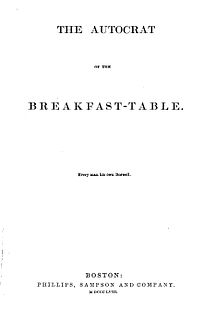 Cover of the first edition of The Common Law. | |
| Author | Oliver Wendell Holmes Jr. |
|---|---|
| Country | United States |
| Language | English |
Publication date | 1881 |
| Media type | Paper |
The Common Law is a book that was written by Oliver Wendell Holmes Jr. in 1881, [1] 21 years before Holmes became an Associate Justice of the Supreme Court of the United States.

As a physical object, a book is a stack of usually rectangular pages oriented with one edge tied, sewn, or otherwise fixed together and then bound to the flexible spine of a protective cover of heavier, relatively inflexible material. The technical term for this physical arrangement is codex. In the history of hand-held physical supports for extended written compositions or records, the codex replaces its immediate predecessor, the scroll. A single sheet in a codex is a leaf, and each side of a leaf is a page.

Oliver Wendell Holmes Jr. was an American jurist who served as an Associate Justice of the Supreme Court of the United States from 1902 to 1932, and as Acting Chief Justice of the United States in January–February 1930. Noted for his long service, concise and pithy opinions, and deference to the decisions of elected legislatures, he is one of the most widely cited United States Supreme Court justices in history, particularly for his "clear and present danger" opinion for a unanimous Court in the 1919 case of Schenck v. United States, and is one of the most influential American common law judges, honored during his lifetime in Great Britain as well as the United States. Holmes retired from the court at the age of 90, making him the oldest justice in the Supreme Court's history. He also served as an Associate Justice and as Chief Justice of the Massachusetts Supreme Judicial Court, and was Weld Professor of Law at his alma mater, Harvard Law School.

The Supreme Court of the United States (SCOTUS) is the highest court in the federal judiciary of the United States. It has ultimate appellate jurisdiction over all federal and state court cases that involve a point of federal law, and original jurisdiction over a narrow range of cases, specifically "all Cases affecting Ambassadors, other public Ministers and Consuls, and those in which a State shall be Party". The Court holds the power of judicial review, the ability to invalidate a statute for violating a provision of the U.S. Constitution. It is also able to strike down presidential directives for violating either the Constitution or statutory law. However, it may act only within the context of a case in an area of law over which it has jurisdiction. The Court may decide cases having political overtones, but it has ruled that it does not have power to decide non-justiciable political questions.
The book is about common law in the United States, including torts, property, contracts, and crime. It is written as a series of lectures. It has gone out of copyright and is available in full on the web at Project Gutenberg.

Common law is the body of law derived from judicial decisions of courts and similar tribunals. The defining characteristic of "common law" is that it arises as precedent. In cases where the parties disagree on what the law is, a common law court looks to past precedential decisions of relevant courts, and synthesizes the principles of those past cases as applicable to the current facts. If a similar dispute has been resolved in the past, the court is usually bound to follow the reasoning used in the prior decision. If, however, the court finds that the current dispute is fundamentally distinct from all previous cases, and legislative statutes are either silent or ambiguous on the question, judges have the authority and duty to resolve the issue. The court states an opinion that gives reasons for the decision, and those reasons agglomerate with past decisions as precedent to bind future judges and litigants. Common law, as the body of law made by judges, stands in contrast to and on equal footing with statutes which are adopted through the legislative process, and regulations which are promulgated by the executive branch. Stare decisis, the principle that cases should be decided according to consistent principled rules so that similar facts will yield similar results, lies at the heart of all common law systems.

Project Gutenberg (PG) is a volunteer effort to digitize and archive cultural works, to "encourage the creation and distribution of eBooks". It was founded in 1971 by American writer Michael S. Hart and is the oldest digital library. Most of the items in its collection are the full texts of public domain books. The Project tries to make these as free as possible, in long-lasting, open formats that can be used on almost any computer. As of 23 June 2018, Project Gutenberg reached 57,000 items in its collection of free eBooks.
One of the most famous aphorisms to be drawn from this book occurs on the first page: "The life of the law has not been logic: it has been experience." Holmes's pronouncement is a subtle qualification of a dictum by the famous seventeenth-century English jurist Sir Edward Coke: "Reason is the life of the law." [2]
In general usage, a dictum is an authoritative or dogmatic statement. In some contexts, such as legal writing and church cantata librettos, dictum can have a specific meaning.

Sir Edward Coke was an English barrister, judge, and politician who is considered to be the greatest jurist of the Elizabethan and Jacobean eras.










